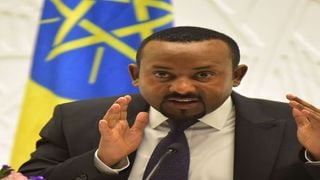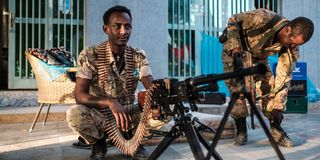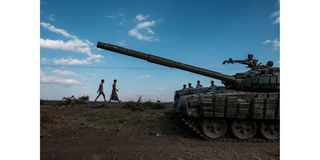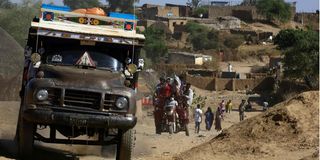
Ethiopian Prime Minister Abiy Ahmed.
| File | AFPAfrica
Premium
Tigray crisis: How Abiy’s reform strategy plunged Ethiopia into conflict
Tigray,
When Ethiopian Prime Minister Abiy Ahmed came to power in 2018, he largely ushered a wave of political reforms.
His first few months in office were characterised by the introduction of a series of political reforms which made him be referred to by many as a “reform champion”.
Among his swift reform moves included the release of thousands of political prisoners, relaxing media control and liberalisation.
But a major turn in events came in June 2018 when Abiy announced his country will “fully accept and implement” a 2000 peace pact which Addis Ababa refused to immediately honour under the former EPRDF regime.
Peace deal
A few weeks later, a peace deal was signed between Abiy and Eritrean President Isaias Afeworki, ending two-decade-long hostilities.
The peace deal led Abiy to win the Nobel Peace prize award in 2019.
After the rapprochement, the former rival neighbours resumed diplomatic ties, reopened border crossings allowing separated families to reunite, further enabling people on both sides to resume trade.
However, these windows of hope didn’t last long as border crossings on both sides were shut down a few weeks later for unclear reasons.
Mr Abiy’s popular reform ideas, however, started to increasingly attract serious criticism from political groups, including from Tigray elites whose people were the ones who most sacrificed during the 1998-2000 border war with Eritrea, which claimed the lives of at least 70,000 people.
Two-man agreement
The Tigray People’s Liberation Front (TPLF) said the peace deal was a two-man agreement and it doesn’t represent a peace agreement between two countries, hence it was not institutionalised.
Ever since Abiy Ahmed came to power, the Tigray regional government has been at odds with the central government.
Tigray leaders have been defying almost all decisions made by the federal government.
The major driving factors of the conflict in Ethiopia’s Tigray region are generally over differences in the system of governance, electoral disputes and power struggles between TPLF leaders and Prime Minister Abiy.
The war on Tigray has two major elements, ideological and historical, says Abera Negash, a political researcher.
“The ideological side of the war is the contention between those who advocate the federalist state arrangement which embraces regional self-determination and self-administration as its cardinal principle [like TPLF] and those who want a unilateralist and centralised state structure with a strong central government [Abiy’s party, PP]”

A member of the Amhara Special Forces sits next to a machine gun at an improvised camp in the front of a shop in Humera, Ethiopia, in November 2020.
Tigray leaders see Abiy's reforms as an attempt to centralise power and attempt to demolish the long-standing federal system which TPLF had embraced since it assumed power in 1991 after toppling the former Marxist Derg regime.
The TPLF, which represents an ethnic Tigrayan minority, dominated the country's national politics and power for 27 years until Abiy came to power in 2018.
The tension between TPLF and Abiy started when the prime minister announced he would dissolve the former TPLF dominated EPRDF ruling party and merge it with his new Prosperity Party (PP), a move TPLF strongly protested against and refused to join the new alliance.
However, “there is an extraordinary background to the war that started immediately after Abiy assumed power,” says a Tigray opposition official who sought anonymity.
“In this respect, the federal government has been taking several measures purposely aimed at sidelining the Tigray region, its leadership and people from the rest of the country”.
“The Abiy government had been selectively prosecuting ethnic Tigray officials over different accusations, including corruption, and further removed them from top government positions. Tigrayan military officials were also fired.”
The opposition official said “the targeted prosecution measures created grievances among the Tigray people and their leaders which escalated into a full-fledged war sooner than later”.
Feud escalated
The feud with the federal government further escalated in September, when the Tigray region held its own elections, defying the central government’s decision to postpone the national polls due to the Covid-19 pandemic. The election was initially scheduled to be held in August 2020.
The region then argued that conducting the election was its constitutional right but its defiance, in effect, undermined the legitimacy of Abiy’s federal government.
Addis Ababa immediately ruled that the election was illegitimate and void. In return, Tigray said it will no longer recognise Abiy’s administration, arguing that Abiy’s constitutional mandate in office had expired.

Youngsters walk next to an abandoned tank belonging to Tigrayan forces south of the town of Mehoni, Ethiopia, in December 2020.
Tigray leaders accused the Nobel Laureate of deliberately postponing the election to retain his grip on power.
After the regional elections, the federal government reacted by slashing budgets, funds and subsidies to Tigray.
Abiy further ordered all federal institutions to immediately cut ties and communication with the regional government.
Tigray leaders saw the punitive measures as a "declaration of war" against Tigray and its people who make up six per cent of the country's estimated 110 million population.
However, the tension between Tigray and the central government boiled early in November when Prime Minister Abiy accused TPLF forces of attacking a federal army based in the region.
'Red line'
In a televised address, Abiy said Tigray had crossed the "red line" and he officially declared a military offensive against the region on November 4.
He sent ground and air forces in a bid to dislodge the TPLF-led regional force, raising fears of a protracted conflict in Africa’s second-most populous country.
Amare Seyoum, a former army member and resident of Mekelle, explains why TPLF had attacked the North Command Army.
“The federal government wants to restructure the military structure by increasing regional military commands from five to six as an effort to wage war against Tigray from all directions by sandwiching it,” he told the Nation.

Ethiopian refugees who fled the fighting in the Tigray region head to a reception center in Hamdayit, Sudan, in November 2020.
Amare said the federal government has also mobilised the military as part of the preparation to wage war against Tigray.
“This has also been a warning sign for TPLF. Cognisant of this move, TPLF has taken pre-emptive measures against the North Command Army and controlled their base and seized all their heavy weapons. They took hostage its leaders as a self-defence mechanism.”
“The attack served as an immediate cause for the federal government to trigger war on Tigray,” he added.
Since early November, the Tigray region remained a battleground.
After the capture of the regional capital Mekelle on November 30, PM Abiy announced that the law enforcement operation against the region was over and what remained is a hunt to arrest TPLF leaders.
However, several sources from the region have confirmed to the Nation that fighting is going on between the Tigray defence forces and the allied forces of ENDF, Eritrean forces, and the Amhara militia in many rural parts of the region.
The war may be arguably over, but there will be sporadic battles.
Sources said TPLF is fighting against joint Federal forces, Amhara regional forces and militias as well as Eritrean soldiers.
“The war may be arguably over, but there will be sporadic battles so long as the political and military leadership of TPLF remains operational,” Metta-Alem Sinishaw, a political analyst on Ethiopia and East Africa, told the Nation.
“The era of political and military dominance of TPLF may be over. However, TPLF still has determined militants, diaspora based radical wings, substantial resources, and exiled members some with strong international tie. It will have a fighting chance for some time, especially if it aligns itself with ethnocentric forces that it cultivated during its heyday,” he added.
Horn region
Considering Tigray’s powerful military, estimated at 250,000 troops, the conflict could be far from over.
Thus, there is a high possibility for the conflict to spill into the Horn region. There are already some signs that the war is attracting other regional actors.
In this respect, Sudan seems to already have become a party to the conflict after Ethiopian forces and the Amhara regional militias entered its territory and ambushed a military unit patrolling inside its own border.
“Sudan has always been ambivalent and may be sympathetic to TPLF.
Egypt may support TPLF either directly or indirectly to destabilise the federal government to undermine its effort on GERD. Also, there are many regional and Gulf actors. Qatar may align with TPLF to counter Abiy’s closeness with UAE,” Metta-Alem said.
Metta-Alem believes Abiy’s “military victory over TPLF” will consolidate the Ethiopian position to continue as a regional security guarantor.
“Despite the new partnership between Ethiopia, Eritrea and Somalia, there will be a power vacuum In the Horn region, especially in the short run,'' he said.
According to the political analyst, the future of Ethiopia requires serious internal reflection and reconfiguration, including engaging the Tigrayan elites.





